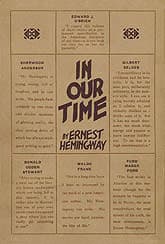In Our Time
Critique • Other views • Quotes
 First commercial edition, 1925
First commercial edition, 1925First publication
1924, Paris, vignettes appearing in in our time
First complete publication
1925, New York
Literature form
Stories, vignettes
Genres
Literary
Writing language
English
Author's country
United States
Length
Approx. 47,500 words
Critiques and reviews
1926
"In Our Time" consists of fourteen stories, short and long, with fifteen vivid miniatures interpolated between them. When I try to think of any contemporary American short stories as good as "Big Two-Hearted River," the last one in the book, only Gertrude Stein's "Melanctha," [Sherwood] Anderson's "The Egg," and Lardner's "Golden Honeymoon" come to mind. It is the account of a boy on a fishing trip—he hikes, pitches his tent, cooks dinner, sleeps, and next morning casts for trout. Nothing more—but I read it with the most breathless unwilling interest I have experienced since Conrad first bent my reluctant eyes upon the sea.
The hero, Nick, runs through nearly all the stories, until the book takes on almost an autobiographical tint—in fact "My Old Man," one of the two in which this element seems entirely absent, is the least successful of all. Some of the stories show influences but they are invariably absorbed and transmuted, while in "My Old Man" there is an echo of Anderson's way of thinking in those sentimental "horse stories," which inaugurated his respectability and also his decline four years ago.
But with "The Doctor and the Doctor's Wife," "The End of Something," "The Three Day Blow," "Mr. and Mrs. Elliot," and "Soldier's Home" you are immediately aware of something temperamentally new. In the first of these a man is backed down by a half breed Indian after committing himself to a fight. The quality of humiliation in the story is so intense that it immediately calls up every such incident in the reader's past. Without the aid of a comment or a pointing finger one knows exactly the sharp emotion of young Nick who watches the scene.
The next two stories describe an experience at the last edge of adolescence. You are constantly aware of the continual snapping of ties that is going on around Nick. In the half stewed, immature conversation before the fire you watch the awakening of that vast unrest that descends upon the emotional type at about eighteen. Again there is not a single recourse to exposition. As in "Big Two-Hearted River," a picture—sharp, nostalgic, tense—develops before your eyes. When the picture is complete a light seems to snap out, the story is over. There is no tail, no sudden change of pace at the end to throw into relief what has gone before.
Nick leaves home penniless; you have a glimpse of him lying wounded in the street of a battered Italian town, and later of a love affair with a nurse on a hospital roof in Milan. Then in one of the best of the stories he is home again. The last glimpse of him is when his mother asks him, with all the bitter world in his heart, to kneel down beside her in the dining room in Puritan prayer.
Anyone who first looks through the short interpolated sketches will hardly fail to read the stories themselves. "The Garden at Mons" and "The Barricade" are profound essays upon the English officer, written on a postage stamp. "The King of Greece's Tea Party," "The Shooting of the Cabinet Ministers," and "The Cigar-store Robbery" particularly fascinated me, as they did when Edmund Wilson first showed them to me in an earlier pamphlet, over two years ago.
Disregard the rather ill considered blurbs upon the cover. It is sufficient that here is no raw food served up by the railroad restaurants of California and Wisconsin. In the best of these dishes there is not a bit to spare. And many of us who have grown weary of admonitions to "watch this man or that" have felt a sort of renewal of excitement at these stories wherein Ernest Hemingway turns a corner into the street.
— F. Scott Fitzgerald, from "How to Waste Material: A Note on My Generation", The Bookman

